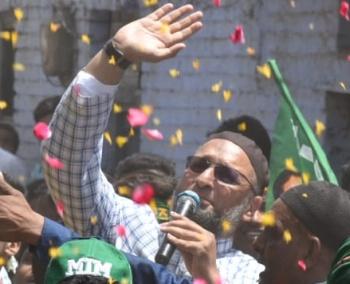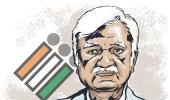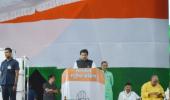MIM workers tried to shoo the complaining woman and her silent husband away, but Owaisi insisted that she be heard.
As he turned to leave, he told her: "Good that you spoke up. Keep doing that."
Jyoti Punwani reports from Aurangabad.
Photographs: SnapsIndia
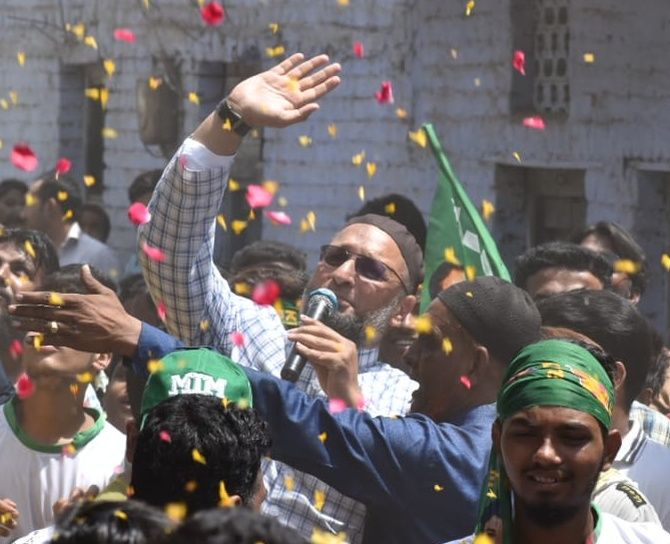
Aurangabad is abuzz with the news that All India Majlis-e-Ittehadul Muslimeen President Asaduddin Owaisi is walking through its narrowest and sometimes filthiest lanes seeking votes door to door for sitting MLA Imtiaz Jaleel, who is contesting the Lok Sabha seat as a joint MIM- Bahujan Vanchit Aghadi candidate.
Owaisi's two padyatras have been revelatory. For one, they have confirmed the common complaint one hears in this historic city: That this election has become one of identity politics alone, with basic issues being ignored.
These padyatras have also thrown up the contrasts and contradictions between the two alliance partners. The very first padyatra showed this up starkly: As the padyatra stopped at a Buddh Vihar, Asaduddin Owaisi directed his followers to go inside while he himself declined to do so.
Jaleel went in and paid his respects to the idol of Buddha, along with his Dalit colleagues, while his party chief waited outside.
The Congress is milking this 'disrespect' to the religious feelings of the Dalits shown by the MIM leader. However, when Rediff.com joined Owaisi on his second padyatra, the Dalits far from showing any hurt, were even more enthusiastic in their participation than the MIM followers.
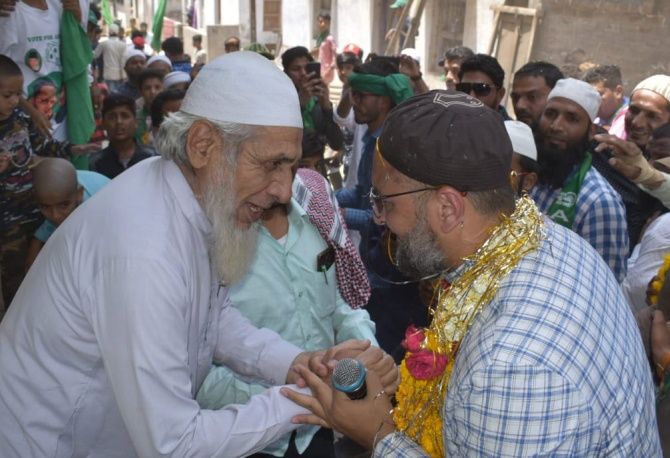
Owaisi's tall figure dominated the padyatra.
As he led the padyatra through the rarrow lanes of the old Muslim basti of Harsul in Aurangabad, one had to strain to find his Lok Sabha candidate Imtiaz Jaleel in the all-male crowd trailing him.
A former television journalist, Jaleel was almost indistinguishable in his checked shirt and trousers from the rest of the followers. Jaleel laughed wryly when Rediff.com caught up with him.
"No point trying to keep pace with him," he said, gesturing towards the crowd that milled around Owaisi wherever they got a chance, mostly to garland him or drape the typical local white or green checked gamcha around his neck.
Owaisi repeated a simple message all through the padyatra: "Main Asaduddin Owaisi Hyderabad se aaya hoon, aap ko bolne ki 23 tarikh ko MIM ke Imtiaz Jaleel ko vote dena."
The Hyderabad MP chose to stop at a number of places, specially where he saw elderly men or a group of women, for example, veiled teachers behind the gate of an Urdu school. But there were longer interactions thrust upon him during the padyatra.
These were almost always by women and all of them had just one grouse: The lack of water.
Every time this happened, Owaisi called out to Jaleel to come and listen to the women and answer them. At the first such stop, MIM workers tried to shoo the complaining woman and her silent husband away, but Owaisi insisted that she be heard.
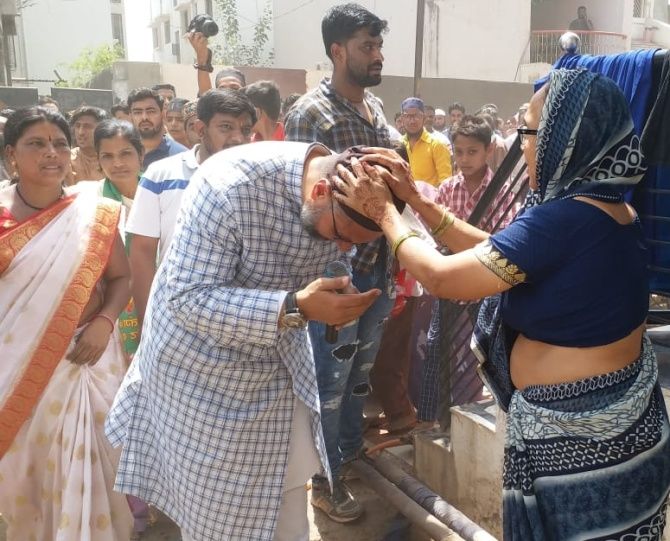
As he turned to leave, he told her: "Good that you spoke up. Keep doing that."
After that, no one came in between whenever he was accosted by locals.
"You promised us water," said a group of women to Jaleel. "We work in people's homes and cannot stay home when the tanker comes. To go buy water costs a lot." "I know, a pipeline must be laid," the MLA responded.
"Didn't I keep my promise and get these roads made for you?" The women nodded, but repeated that he must get them water. "We will say namaaz twice for you," another group of women told Owaisi. "Just get us water."
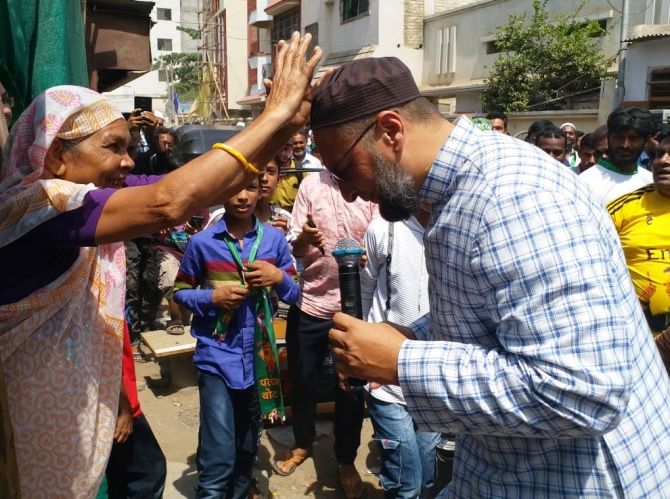
In Aurangabad, water comes once in 4 days if you stay in the 'right' side of town and once in 11 days if you stay in the old ghettos.
In unauthorised colonies, such as those graced by Owaisi, the municipal corporation does not supply water till the colony gets an NOC from the local corporator, who, Jaleel informs Owaisi, is often a BJP man.
The flawed Samaantar water supply scheme initiated on a public-private partnership basis by sitting MP Chandrakant Khaire of the Shiv Sena, who is seeking a fifth term, is also to blame, said Jaleel. It was finally stopped after activists approached the court.
Expectedly, the areas chosen by the MIM for its padyatras are Muslim dominated colonies where Jaleel has laid some roads. But the padyatra also made its way through Dalit pockets, where marigold flowers were showered on Owaisi and Jaleel.
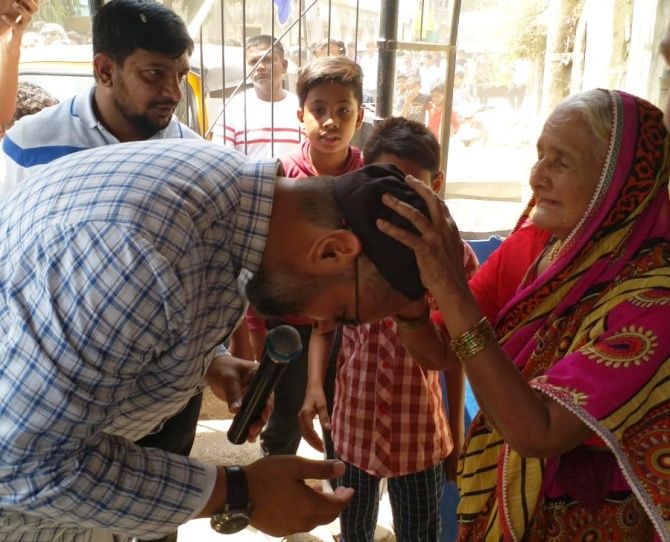
For the first time, shouts of "Jai Bhim Jai MIM" were raised by the group, with Owaisi too shouting "Jai Bhim" and greeting people with a namaste. In these pockets, the Dalit volunteers left Jaleel's far behind in their slogan shouting.
In fact, all through, while the young MIM padyatris hardly raised any slogans apart from "Kaun aya kaun aya, sher aya sher aya", the Dalits shouted a variety of slogans including "Prakash Ambedkar chya vijay aso, jai Bhim, jeetega bhai jeetega Prakash Ambedkar jeetega."
At this juncture, for the first time, women also joined the padyatra and were the first to raise slogans. From the MIM, only once did two young women make an appearance, only to disappear in a short while.
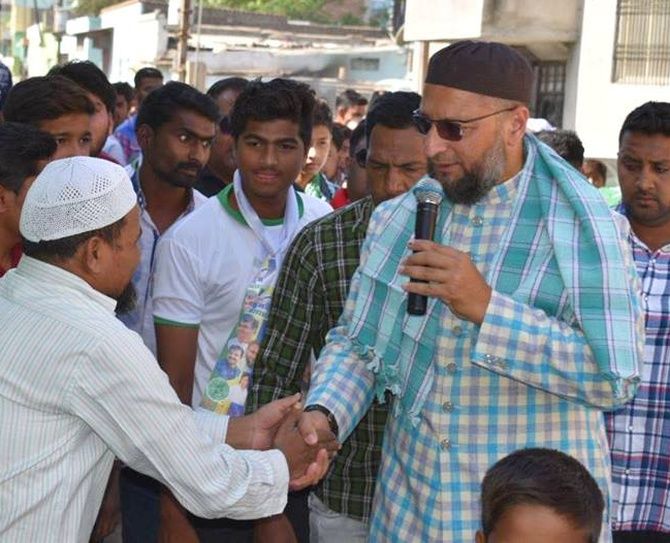
A curious participant for a short stretch was a Class 7 girl in her school uniform. "School finished today and I've come straight here," says Shaina. She thought the padyatra was fun. She knew she couldn't vote, but she could tell her mother to vote for Jaleel, she said.
Why? " Because Imtiaz Jaleel is from our community and he has constructed a road near my school."
The padyatra started at 9.30 am and by 11 am Owaisi called a halt, though a visit to a masjid as well as to a Dalit hall and a Dalit supporter's residence was yet to happen.
By then, the sun was blazing down and long stretches were traversed with no one within talking distance.
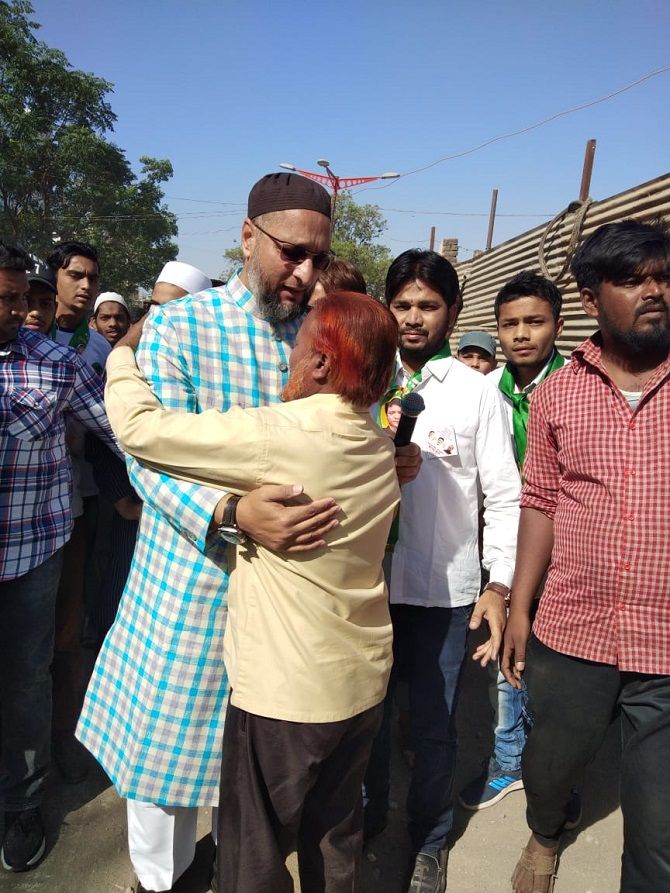
"Are these padyatras worth it, considering the few people you actually meet?" I ask Jaleel. "My workers were insistent that Mr Owaisi be brought here to campaign, " he shrugs.
Later that evening, Muslims dispersing from a meeting addressed by Owaisi in the old Muslim quarter of Roshan gate tell Rediff.com: "Is there any other party chief who walks in the sun in a city where he himself is not standing, to meet voters?"
